November 2, 2012
By Michelle Passante
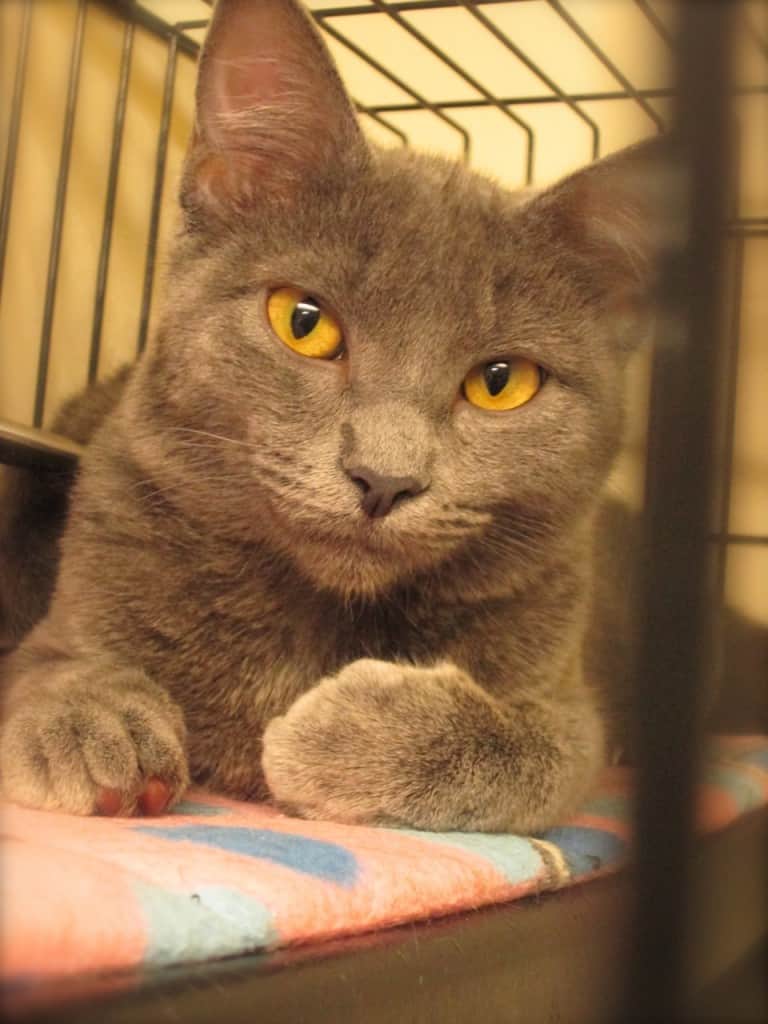
?photo Katherine Keller
Ezma, Happy, and Oklahoma need a home. They, along with about 130 other kittens and adult cats, await adoption at Second Hand Purrs, a no-kill nonprofit shelter that has been finding homes for felines since 2004. The shelter is housed in the building that was formerly Balsmider?s Food Market, 4300 S. Howell Ave., 10 blocks north of General Mitchell International Airport.
Sandra Gapinski and two other experienced animal rescuers founded the shelter eight years ago to create a safe haven for abandoned cats and kittens. ?We saw so many cats being turned away from shelters simply because there was no room,? said Gapinski. ?So we unofficially began the shelter in the upper level of my duplex about three months before our official opening on Howell Avenue.?
The 501(c)(3) nonprofit shelter survives solely on material and monetary donations from the public. Board members Nancy Benoit, Jane Francis, Rhonda Kimmel, and Sandra Hegemann oversee the shelter?s operations.
At present, Second Hand Purrs houses more than 60 cats and kittens, with another 75 in homes waiting for adoption. Only surrendered cats are accepted; the staff does not seek or pick up strays.
When space permits, the shelter also takes in kittens from Milwaukee Area Domestic Animal Control Commission (MADACC) and other shelters with an over-flow of the juvenile animals. However, Second Hand Purrs is presently at full capacity with a waiting list of people who want to surrender adult cats to the shelter.

Happy ?photo Jennifer Kresse

Smokie ?photo Katherine Keller
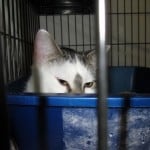
Pyle ?photo Katherine Keller
?
?
?
?
?
?
Modus operandi
Second Hand Purrs carefully evaluates their wards before placing them in new homes. After accepting a surrendered cat or kitten, each spends time in a foster home before being admitted to the shelter itself. While in foster care, the cat?s health, personality, temperament, and ability to socialize with other pets/animals are evaluated, as well as their tolerance or ability to cope with children. In some cases, the shelter departs from its protocol and allows a cat to be adopted directly from the foster home.
On average, an adult cat spends six months to a year in foster care. Given the length of time the cats spend in foster care plus the number of cats, the shelter needs many foster homes and people for fostering. There are presently 15 foster homes, but the shelter urgently needs 10 more.
Those who foster a cat for Second Hand Purrs incur no costs because the shelter provides cat litter, food, and veterinary care.
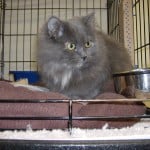
Zelda ?photo Michelle Passante
Carlo, a sweet-natured 10-month-old orange tabby, is an example of how Second Hand Purrs strives to save every cat in the shelter. Rescued from MADACC when only eight weeks old, Carlo had a rough start in life. At 5 months, Carlo developed a severe respiratory infection. Many tests and x-rays eventually led to a possible diagnosis of chronic obstructive pulmonary disease (COPD), which he was treated for. Carlo was neutered and was given one more test four months later, but unfortunately, the results were inconclusive. Consequently, he will not be ?adopted to a forever home? until an accurate diagnosis is made that confirms his condition is stabilized. In the meantime, Second Hand Purrs will need more advice from a veterinarian, which translates to more medical bills for the shelter. Veterinary services are provided by Community Veterinary Clinic in Bay View and by Franklin Veterinary Clinic.Second Hand Purrs does not euthanize except in cases where the cat is suffering and can no longer be aided by medical care. Some shelters may deem older cats or cats with behavior problems as not adoptable, but not Second Hand Purrs. ?Every cat and kitten that comes through the shelter doors is given a chance,? said Hegemann. If a cat?s medical issues or behavioral problems are too complex to be remediated, the cat is given a home at the shelter for life.
?
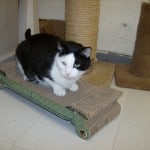
Arnie ?photo Michelle Passante
The depressed economy has also contributed to the number of cats returned to the shelter. There were four months in a row in 2011 when more cats were returned than cats adopted.?The shelter?s goal for 2012 is 250 adoptions.The recession has taken a toll on the number of adoptions over the past several years. Some families can no longer afford to care for their pet because of a job loss or reduced hours or salary. In 2010, 231 cats were adopted, but only 186 found homes in 2011.
Other circumstances that cause people to surrender a cat include moving into an apartment where pets are not allowed, moving into a nursing home, or needing to give up a cat who can?t blend with the family?s other pets.

Ezma ?photo Jennifer Kresse
Adoption processWhen prospective adopters come in, the shelter?s staff member gathers information about the family?s household: the number and age of children; existing pets in home including their age and temperament; character of the home?quiet, noisy, busy? Prospective adopters are also asked about the type of personality they are looking for. Do they want a playful cat, a calm cat, or a lap cat?
?We try to make the best match we can, with what we know about our cats? temperaments, and what we find out about the people looking to adopt,? Jane Francis said. ?It may seem that we?re being nosy, but asking about the presence of children, other pets, and the general activity level of the household helps us to recommend certain cats over others.? The applicant is also asked if the pets in their homes see the vet on a yearly basis.
Cats 6 months and older are spayed or neutered. The adoption fee also includes a distemper booster, deworming/preventative, flea bath, ear mite treatment (if needed), stool test, nail trim, and a rabies booster. Kittens must be 9 weeks old before they can be adopted. When kittens younger than 6 months are adopted, calls are made to make sure that the kitten is spayed/neutered by the time they are 6 months old.
The shelter?s adoption fee is $80 for one cat/kitten or $130 for two and applicants must be age 21 or older.
The shelter will not release a cat until the staff reviews the application, which can take a few days. Then a shelter staffer delivers the cat to the adopted home (up to 50 miles from the shelter) so the home environment can be evaluated.
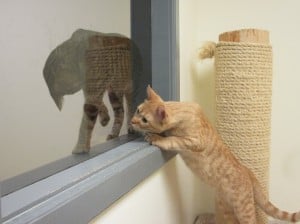
Carlo ?photo Jennifer Kresse
Second Hand Purrs is operated entirely by volunteers. There are no paychecks for board members, the bookkeeper, members of the fundraising committee, or for those who administer medicine, clean cages and litter boxes, and who socialize with the cats. ?They all do it for the love of the cats,? Nancy Benoit said. The shelter always needs more people to become volunteers for daily cleaning shifts and to work with the public on days that the shelter is open. Volunteers must be age 18 or older. Children under 18 may volunteer but must be accompanied by a supervising adult.
Second Hand Purrs placed 1,765 in new homes between September 2004 and January 2012.
Second Hand Purrs
Th 6-9pm; Sat 10am-3pm
Voicemail: (414) 727-7877
secondhandpurrs@gmail.com
secondhandpurrs.org + Facebook
?
This material may not be published, broadcast, rewritten or redistributed.
Source: http://bayviewcompass.com/archives/12663
game of thrones wrestlemania 28 game of thrones season 2 dierks bentley kenny chesney blake shelton academy of country music awards
No comments:
Post a Comment
Note: Only a member of this blog may post a comment.